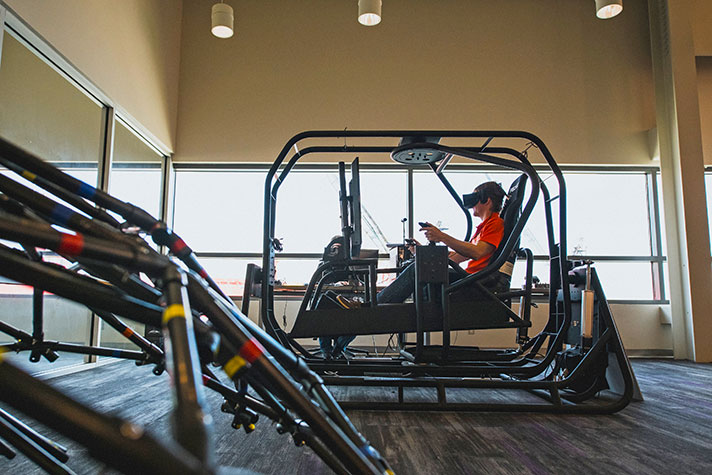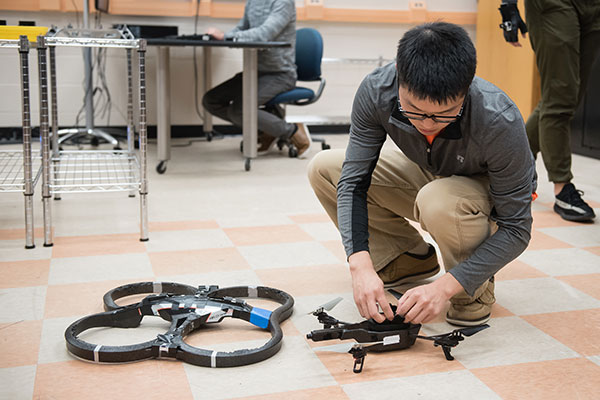Labs and Groups
Innovative Research
The School of Computing faculty extends across three research divisions - Computer Science, Visual Computing, and Human-Centered Computing. Specialized equipment is available for advanced study, including virtual/augmented reality, deep learning, motion capture, and eye-tracking. The Clemson Palmetto supercomputer offers high-performance computing and data analytics facilities on a satellite campus. Helmed by faculty members, graduate and undergraduate students can request to assist in the research.

AI-SENDS
Dr. Abolfazl Razi
In the AI-based Sensing, Networking, and Data Services (AI-SENDS) lab, we are working on powering sensing, networking, and data-driven actuation networks with computational intelligence. The core of our research is developing predictive models and deep learning algorithms for smart AI-powered agents to perceive the environment and take informed actions based on their anticipated consequences.
Applied Algorithms Group
Dr. Brian Dean
The Applied Algorithms Group studies the theory and practice of algorithmic computer science, as well as related computing education efforts. Fundamental research includes algorithmic theory in optimization, data structures, randomization, and large-scale data analytics. On the applied side, we investigate applications of algorithmic computing in a number of areas, including biomedical informatics.
BIG CAT Research Group
Dr. Christopher Flathmann
The Building Intelligent Goals for Collaborative AI Technologies (BIG CAT) Research Group explores the design and application of emerging AI technologies. BIG CAT's research foci center around the acceptance of AI technology, the impact of AI technology on teams and the workforce, and the application of AI in digital and robotic systems.
Big Data Analytics Lab
Dr. Feng Luo
Research areas in the Big Data Analytics Lab have included Deep Learning and application, high throughput biological data analysis, data-intensive bioinformatics, network biology, computational genomics and genetics. Ongoing projects include efforts to sequence the human reference genome, which could lead to new advances in personalized medicine, and counteracting citrus greening disease to ensure that future citrus varieties are both hardy and economically viable for commercial production.
Countenance Lab
Dr. Eric Patterson
The Countenance Lab focuses on the intersection of humanity and technology by considering the face as the primary means of interaction. A variety of disciplines, including graphics, animation, computer vision, pattern recognition, machine learning, and biometrics, as well as psychology, visual effects, filmmaking, and others, are studied, integrated, and further developed to increase knowledge and understanding as well as improve interactive computing technologies.
CUSecLAB
Dr. Long Cheng
Cyber Security Research Lab (CUSecLab) strives to develop effective solutions to address realistic security issues created by today's emerging technologies/domains, including the Internet of Things (IoT), Cyber-Physical Systems (CPS), deep learning, edge computing, 5G, mobile computing, and cloud computing. We also conduct interdisciplinary research focused on detecting online abuse on social media platforms.
DevLab@Clemson
Dr. Paige Rodeghero
DevLab@Clemson studies how software engineers work and builds tools to help them be more productive, collaborative, and adaptive. We research developer onboarding, collaboration in distributed teams, and AI-assisted software development, combining insights from software engineering, human–computer interaction, and the social sciences. Our goal is to create practical, evidence-based solutions that improve the daily experience of developers at all skill levels.
DICE Laboratory
Dr. Amy Apon
The Data-Intensive Computing Ecosystems (DICE) lab facilitates collaboration with other scientific disciplines and industries to develop data-intensive and data-enabled applications. A significant part of working with Big Data is to understand how to deploy, monitor, and tune data-intensive systems through such things as efficient deployment, scheduling, and management of large-scale HPC systems within commercial clouds and developing better metrics for exploring and analyzing topic model output.
EQUI-TECH Lab
Dr. Emma Dixon
The Enhancing Quality of Life and Inclusion through Technology (EQUI-TECH) Lab takes a human-centered approach to research the design of technologies to extend and enhance human abilities, with a particular focus on technologies to address societal inequity, improve individual quality of life, and increase inclusion.
EYECU Lab
Dr. Andrew Duchowski
EYECU: Eye Tracking Lab houses state-of-the-art tracking equipment for research on gaze capture, analysis, and interaction. State-of-the-art eye-tracking stations are located in McAdams. Research includes diagnostic (visual attention distribution), interactive (gaze-contingent display) applications, computer vision and digital imaging, and human-computer interaction.
CUGAME
Dr. Guo Freeman
The Gaming and Mediated Experience (CUGAME) Lab uses a human-centered approach to investigate the mediated experience and social dynamics forged surrounding technological objects and collaborative systems. We are especially interested in technology-mediated communication and participation in various contexts, computer-mediated interpersonal relationships and group behaviors, digital creativity, and collective innovation.
HPCeSE Lab
Dr. Shuangshuang Jin
The HPCeSE Lab builds a bridge between the fields of computer science and other disciplines by providing efficient, high-performance computing (HPC)-based solutions (e.g., distributed and parallel computing, GPGPU, big data analysis, machine learning, and scientific visualization, etc.) to pressing scientific and engineering domain problems such as power system simulation, biological network modeling, and advanced grid analytics.
HAIE Lab
Dr. Carlos Toxtli-Hernandez
At the Human-AI Empowerment Laboratory (HAIE Lab), we seek to fuse the principles of Human-Centered Artificial Intelligence with the design of AI-powered tools that help individuals reach their goals. With a steadfast commitment to a Use-Inspired AI approach, we explore the various domains where AI can make significant impacts in ethical, safe, and value-aligned contexts; we also delve into the social implications of AI tools to ensure they operate for the collective benefit of society.
HATLab
Drs. Kelly Caine, Bart Knijnenburg, Katie Park
The Humans and Technology Lab (HATLab) is a multidisciplinary space where students, faculty, and researchers come together to investigate all aspects of humans' interactions with technology. In particular, we are interested in human-centered computing, human factors, human-computer interaction, health informatics, usable privacy and security, privacy-enhancing technologies, empirical methods, and designing for special populations.
IDAVIS
Dr. Federico Iuricich
The Interactive Data Analysis and Visualization (IDAVIS) lab focuses on the development of new interactive tools to enhance people's ability to explore and understand scientific data. Our research interests include scalar field and multivariate data analysis, time-varying data analysis, topological data analysis, multiresolution modeling, and spatial data structures.
L.A.U.G.H.I.N.G. Lab
Dr. Jerry Tessendorf
The Laboratory for the Advancement, Understanding, and Generation of High Impact Natural Graphics pioneers state-of-the-art graphics research on topics in volumetric modeling, simulation, and rendering. This research usually finds applications in the production of cutting-edge visual effects in feature films. Recent research has helped simulate and render clouds, ocean surfaces and the surfaces' interaction with boats and other objects that can be used in teaching, research and film production.
Multimedia and Informatics Lab
Dr. James Wang
Multimedia and Informatics Lab works on challenging core computer science problems as well as complex interdisciplinary research problems. Our research interests include distributed computing, storage systems, P2P, cloud computing, information retrieval, bioinformatics, wireless networks, multimedia systems, web technologies, and data mining. Recent research has consisted of devising effective algorithms to determine the functional similarity of genes.
PERSIST
Dr. Jacob Sorber
Pervasive Sensing And In Situ Technologies (PERSIST) focuses on low-cost, sustainable, and easily deployable technologies for small computational things in a mobile and unpredictable world. Interests include batteryless computing, energy, The Internet of Things, mobile health, smart cities, and more.
SCALab
Dr. Rong Ge
The Scalable Computing and Analytics Lab (SCALab) develops models, software, and system prototypes that allow workloads to efficiently utilize modern computing, storage, and networking technologies at scale and address concerns of scalability and inefficiency. Recently, we investigated how to better support deep learning workloads on various systems, including scalable distributed deep learning and interference on mobile and other battery-powered systems.
0X5EC1AB
Dr. Zhenkai Zhang
5ecurity 1aboratory welcomes ethical hackers and security researchers who are interested in discovering and fixing vulnerabilities in the low-level world of computers, including but not limited to OSes, CPUs, GPUs, and other I/O devices. Research focus is on computer systems security and cyber-physical/real-time/embedded systems. Our goal is to improve the security of these systems and protect them against potential threats.
Synthetic Personas Research Lab
Dr. Matias Volonte
The primary focus of the Synthetic Personas Research Lab is dedicated to advancing the field of conversational virtual humans. We focus on creating virtual humans that can understand and respond to human verbal and non-verbal input, tailor their behavior and physical attributes to different users, and provide meaningful assistance and support. Our lab aims to revolutionize the way people interact with technology, making this interaction more intuitive, effective, and enjoyable for users.
Tangible Visualization Group
Dr. Brygg Ullmer
The Tangible Visualization Group investigates cyber-physical interfaces for engaging with diverse computational systems. The physical editions of our interfaces incorporate diverse display elements, sensors, and fabrication technologies. Our virtual editions employ multitouch GUIs, VR, and other approaches. Examples of cyber-physical elements include special "challenge" coins, pages, books, and portals. Many of our applications engage ICy STEAM – especially computational genomics – while also engaging broader topics and impacts.
TRACE Research Group
Dr. Nathan McNeese
The Team Research Analytics In Computational Environments (TRACE) Research Group focuses on the intersection of teamwork and artificial intelligence with a particular focus on team behaviors in human-AI teaming, ethics in human-AI collaboration, and the development/design of human-computer interfaces for human-AI teaming tools and systems. Additionally, the lab focuses on human-centered computing to enhance societies' capabilities for human-AI teamwork.
TigerSec Laboratory
Dr. Mert Pese
TigerSec Laboratory is dedicated to exploring all facets of automotive security and privacy. In an era where vehicles are becoming increasingly connected and autonomous, our lab aims to address the emerging challenges and vulnerabilities in automotive systems. Through interdisciplinary collaboration and partnerships with industry leaders, our lab aims to develop innovative solutions that ensure the robustness of autonomous systems, onboard networks and computational resources, and communication protocols for the protection of sensitive user data.
Virtual Environments Group
Drs. Sabarish Babu, Andrew Robb
The Virtual Environments Group imagines, designs, builds and evaluates software and technology for all types of virtual environments. Our interests include Immersive Virtual Reality, Virtual Humans, Online Virtual Worlds, 3D User Interface Design, Multi-Modal Interfaces, Conversational Agents, and Clinical Virtual Environments for Teaching and Training.
Vision and Learning Lab
Dr. Siyu Huang
The Vision and Learning Lab (ViL) focuses on learning-based 2D and 3D computer vision techniques, especially their combination with generative AI methods and applications in small-data and noisy scenarios. Our vision is to advance vision and learning methods to enhance our daily life, healthcare, and scientific discoveries.
Graduate Studies
The School of Computing offers seven high-quality graduate-level programs in Computing, including an MSCS Readiness Sequence to prepare for a path in Computer Science. The department has significant strengths in the theoretical, computational, and experimental areas of Computer Science, Visual Computing, and Human-Centered Computing.
Apply | Graduate
